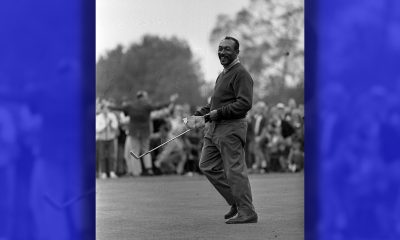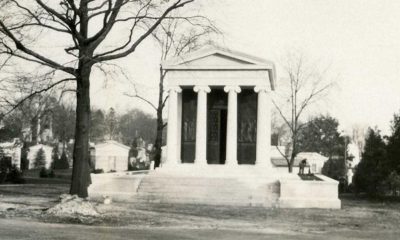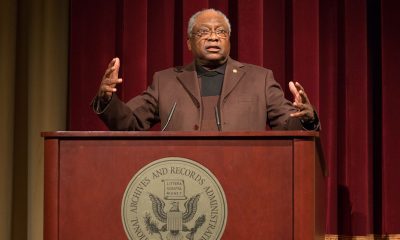Military
Congressman Brown Leads Charge For Transgender Military Service
THE AFRO — Brown has joined a group of bi-partisan representatives who are vigorously challenging President Donald J. Trump’s ban on transgender soldiers.
Maryland Congressman Anthony Brown has joined a group of bi-partisan representatives who are vigorously challenging President Donald J. Trump’s ban on transgender soldiers serving in the military. Sources close to the Congressman, who served in the U.S. Army, said he has never been more “worked up” about an issue as he is about this.
The former lieutenant governor of Maryland joined New York Democrat Sen. Kirsten Gillibrand, and California Democrat Rep. Jackie Speier, chair of the House Armed Services Military Personnel Subcommittee, in co-sponsoring a bill that would protect transgender troops and prevent the Defense Department from essentially terminating their opportunities for performing service to the nation due to their gender identity.
“The president’s bigoted decision to ban transgender Americans from serving in the military carries with it echoes of some of the most ignorant, intolerant moments in our history that saw women, Black Americans, gays and lesbians barred from fully participating in our Armed Forces,” said Rep. Brown.
During a contentious hearing with the House Armed Services Committee’s personnel panel, Brown railed heavily against James Stewart, the Pentagon’s top personnel official. Stewart told the House Armed Services Committee’s personnel panel that the military should keep President Trump’s proposed ban on recruits who have gender dysphoria — the psychological distress caused when a person’s physical or assigned gender conflicts with how they identify — due to the “the accommodations required for gender transition treatments.”
Stewart, however, was careful to explain that transgender soldiers who have had the surgery can still enlist but should not be denied the right to serve altogether. He did appear to express underlying reservations though while using the model that U.S. Armed Services does not allow service by those with preexisting medical conditions such as heart disease, diabetes or cancer, to enlist or serve.
“We are not talking about heart surgery and diabetes,” Brown shot back to Stewart. “We are talking about a group of Americans who identify as transgender. I have never seen a group of Americans who are prone to heart attacks who come lobbying to Congress and saying, ‘Give us the right to serve even though the risk of heart attack is very great because I have already had three or four.’ That is mixing apples and oranges.”
Brown equates the discrimination against transgender soldiers to the struggles of minorities who previously tried to integrate the military. The Maryland Congressman fiercely chiseled away at the arguments by Stewart and Navy Vice Admiral Raquel Bono, director of the Defense Health Agency.
“I hear about special accommodations,” said Brown in a terse but resigned tone. “The same thing was said about African Americans when they wanted to enter an integrated Army in 1948. Same thing was said about gay, lesbian and bisexual members who wanted to serve.”
According to Politico.com, the issues regarding active duty service for transgender soldiers are not any greater than for other personnel. Military instructors have begun to debunk the assertion that transgender military personnel need more time off than their fellow troops, which has been reportedly corroborated by the Pentagon’s own data.
“The Pentagon’s own data show that 393 service members with gender dysphoria have deployed to the Middle East, and of those, only one was unable to complete the deployment for mental health reasons,” according to a statement on Congressman Brown’s website.
While the Trump administration continues to battle for the enacting of its policy, it remains delayed by a series of court battles over its constitutionality. Until it can be resolved, the Obama-era policy still remains in effect.
This article originally appeared in The Afro.
Bay Area
Blacks Celebrate Veterans Day: Admiral J. Paul Reason, U.S. Navy
Joseph Paul Reason graduated from the U.S. Naval Academy at Annapolis, Maryland, in 1965. He retired as a U.S. Navy Admiral, the first Black American officer to become a four-star admiral in the United States Navy.
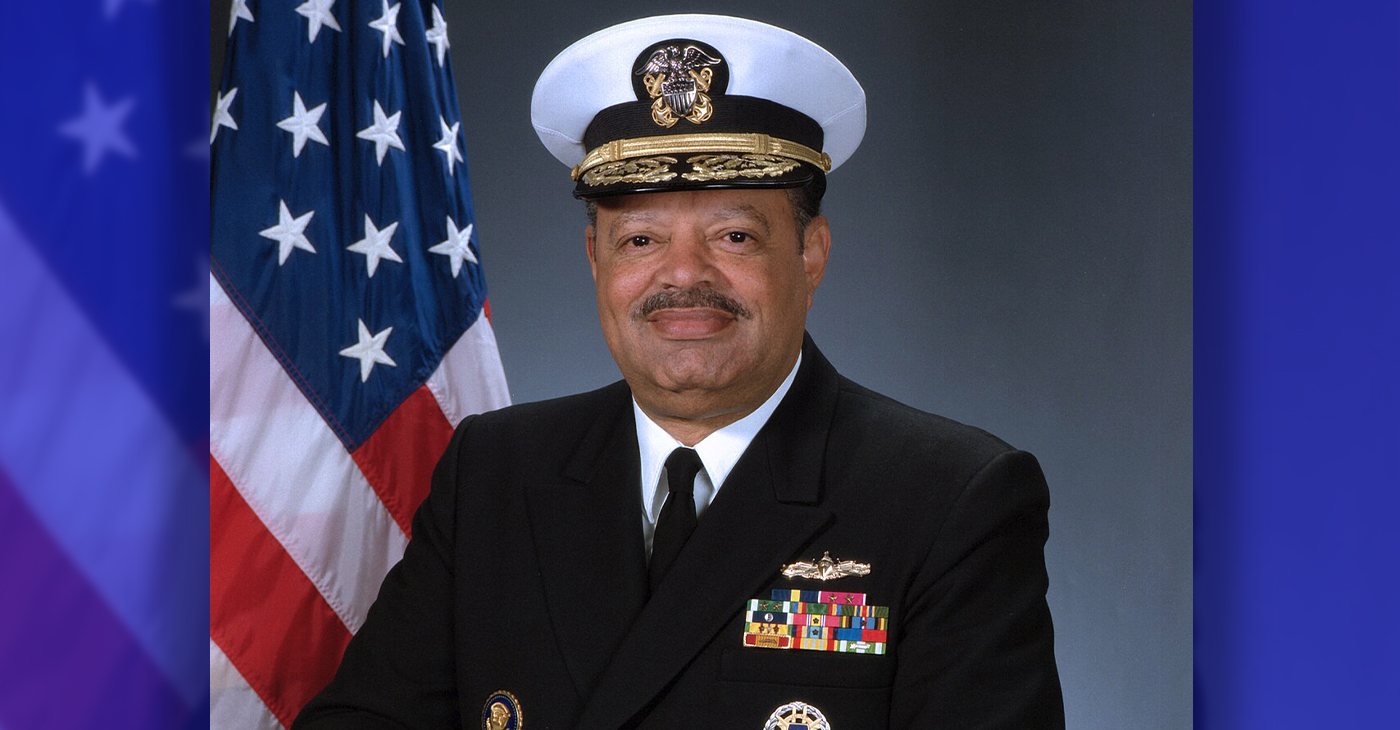
By Conway Jones
Joseph Paul Reason graduated from the U.S. Naval Academy at Annapolis, Maryland, in 1965. He retired as a U.S. Navy Admiral, the first Black American officer to become a four-star admiral in the United States Navy.
Reason’s middle-class upbringing in northeast Washington, D.C., emphasized intellectual development, education, and being culturally well-rounded.
Reason had an outstanding naval career. He was one of four Blacks admitted to the academy in 1961 and one of three to graduate.
In 1965, Reason entered the U.S. Navy’s nuclear power program. In 1968, Reason was named lieutenant and served aboard the USS Truxtun’s first deployment to Southeast Asia. From 1970 to 1973, he was assigned to the nuclear-powered aircraft carrier USS Enterprise as an electrical officer during deployments to Southeast Asia and the Indian Ocean.
In December 1976, Reason was assigned to the White House as naval aide to President Jimmy Carter. His duties included carrying the “football,” a case containing the codes for activating the country’s nuclear weapons.
President Bill Clinton nominated him for promotion to four stars in 1996 and Reason became the first Black admiral in the U.S. Navy.
He retired from active duty in 1999.
“I totally attribute my success to those who have gone before me — all minorities,” Reason said. “People who have broken down barriers by showing others they’re capable of doing the expected task, that they can perform, and it has nothing to do with color of skin or ethnicity — nothing to do with anything other than a person’s capabilities.”
About his service on the aircraft carrier USS Enterprise, he said the deployments were long and arduous, but the Bay Area always welcomed Navy ships and their sailors to the Naval Air Station Alameda homeport.
“Alameda will always be a safe harbor,” said Reason. “I am glad that the USS Hornet Sea, Air & Space Museum maintains that tradition.as she celebrates the 80th anniversary as a carrier and its 25th anniversary as a museum this Veterans Day weekend.”
Black History
Henry Ossian Flipper: A Trailblazer’s Journey from Injustice to Honor
The name Henry O. Flipper shines as a symbol of resilience and triumph over adversity. Born to enslaved parents, Isabella and Festus Flipper, on March 21, 1856, in Thomasville, his early life was marked by the dark shadows of slavery. However, Flipper’s indomitable spirit and thirst for knowledge led him on a path that would make him a trailblazer in breaking racial barriers
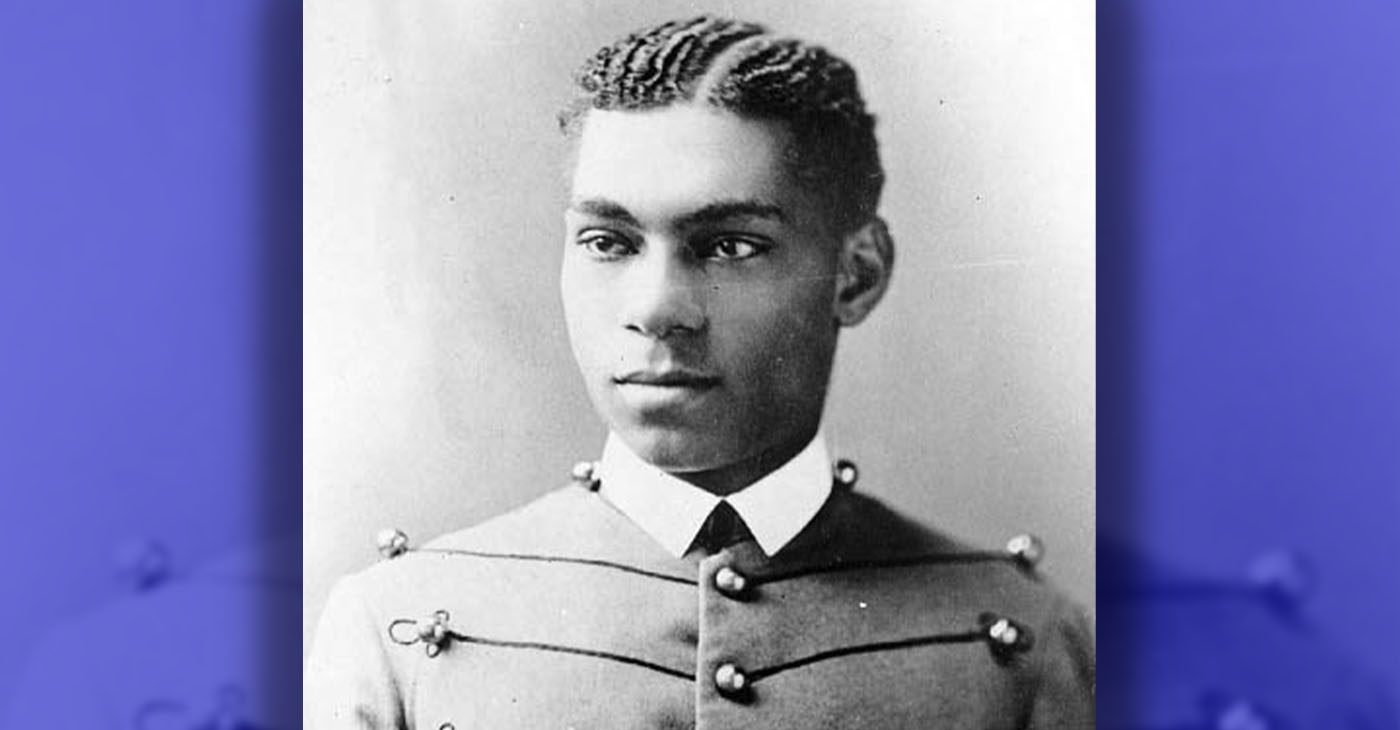
By Tamara Shiloh
The name Henry O. Flipper shines as a symbol of resilience and triumph over adversity. Born to enslaved parents, Isabella and Festus Flipper, on March 21, 1856, in Thomasville, his early life was marked by the dark shadows of slavery. However, Flipper’s indomitable spirit and thirst for knowledge led him on a path that would make him a trailblazer in breaking racial barriers.
After the Civil War, Flipper’s education was supported by the American Missionary Association. He later attended Atlanta University, becoming the fifth African American to receive an appointment to the prestigious U.S. Military Academy at West Point in 1873. His enrollment came at a time when white cadets held prejudiced attitudes, making the environment hostile for African Americans. Despite the challenges, Flipper endured, graduating in 1877, thus becoming the first African American to achieve this monumental feat.
His experiences at West Point, both the triumphs and tribulations, were documented in his 1878 book, “The Colored Cadet at West Point,” shedding light on the discrimination he faced and the determination that carried him through.
Following graduation, Flipper was commissioned as a second lieutenant in the U.S. Army and served with the 10th Cavalry, an African American unit known as the Buffalo Soldiers.
However, his promising career was unjustly derailed in 1881 when he was framed by white officers on charges of embezzlement while stationed at Fort Davis, Texas. Though found not guilty of the major charge, he was still dishonorably discharged, casting a shadow over his reputation. Undeterred, Flipper devoted the rest of his life to fighting for the restoration of his good name.
As a civilian, Flipper’s talents extended far beyond the military realm. He excelled as an engineer, surveyor, and translator, showcasing his proficiency in Spanish by translating critical texts on Mexican tax, mining, and land laws. His work took him to Mexico, where he served as a mining engineer for over a decade.
When he returned to the U.S., he worked for Senator Herbert Fall, advising him on Mexican politics. When Fall became Secretary of the Interior in 1921, Flipper worked with him in Washington, D.C.
Two years later, Flipper traveled to Venezuela where he worked as an engineer in the oil industry, retiring eight years later in Atlanta.
He wrote his memoirs in 1916, offering a candid account of his life, which would later be published posthumously in 1963 as “Negro Frontiersman: The Western Memoirs of Henry O. Flipper.”
The efforts of his descendants were rewarded in 1976 when the Department of the Army finally granted him an honorable discharge, posthumously restoring his good name. In the same year, a bust of Flipper was unveiled at West Point, immortalizing his legacy. President Bill Clinton granted him a full pardon in 1999, a testament to his enduring impact on American history.
He died in 1940, and was initially buried in a cemetery near Atlanta, but his remains were exhumed and again laid to rest in his native Thomasville in 1978, where the post office was named in his honor.
Today, West Point awards a commendation in his name to the graduating senior who demonstrates exemplary leadership, self-discipline, and perseverance in the face of adversity.
Black History
Gen. Charles Quinton Brown, Jr., New U.S. Joint Chiefs of Staff Chairman, Followed the Road Less Taken.
After being sworn in last Friday, Air Force General Charles Quinton Brown, Jr. assumed his role as Chairman, Joint Chiefs of Staff on Oct. 1. He follows retiring General Mark A. Milley who served as the 20th Joint Chiefs of Staff chair. The chairman is the highest ranking and most senior military officer in the United States Armed Forces. He is the principal military advisor to the president, the National Security Council, the Homeland Security Council, and the Secretary of Defense.
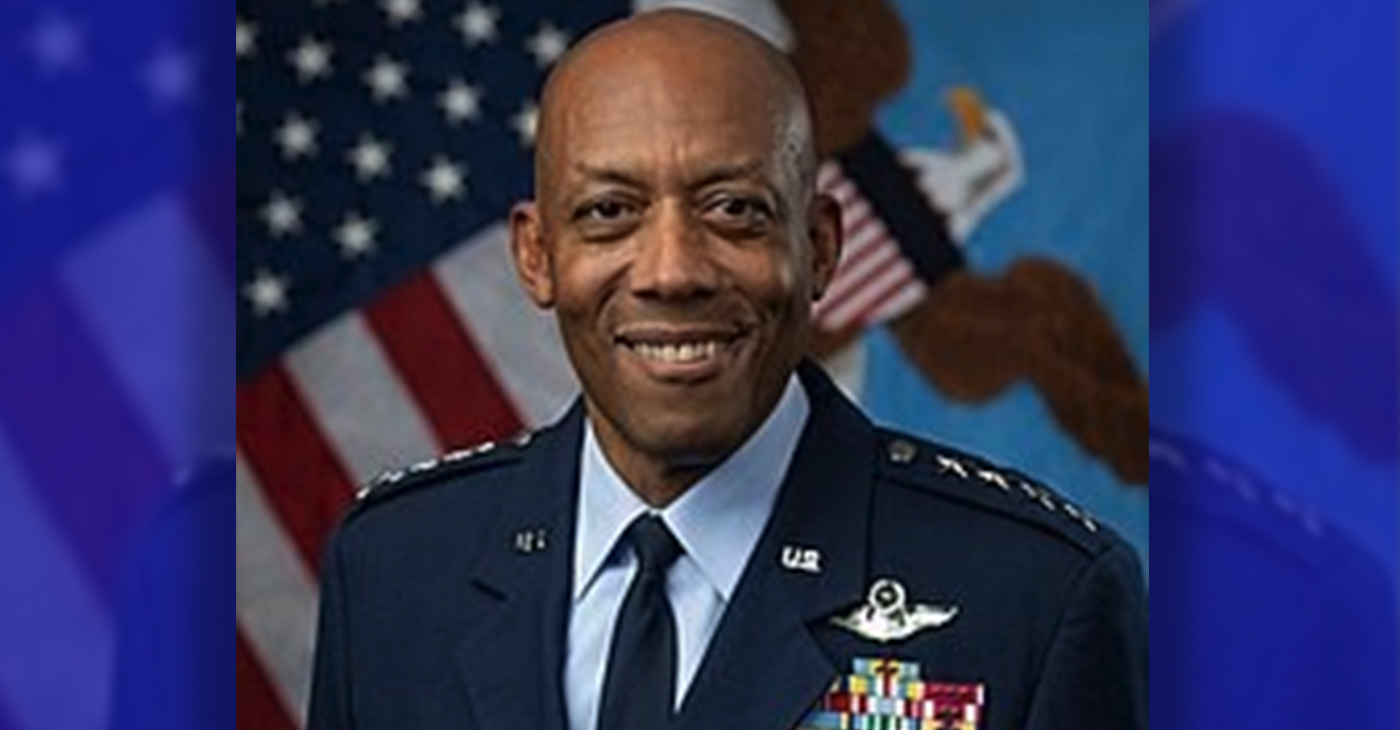
By Conway Jones
After being sworn in last Friday, Air Force General Charles Quinton Brown, Jr. assumed his role as Chairman, Joint Chiefs of Staff on Oct. 1. He follows retiring General Mark A. Milley who served as the 20th Joint Chiefs of Staff chair.
The chairman is the highest ranking and most senior military officer in the United States Armed Forces. He is the principal military advisor to the president, the National Security Council, the Homeland Security Council, and the Secretary of Defense.
Before being confirmed on Sept. 27 as the chairman of the Joint Chiefs of Staff, Brown, who goes by ‘CQ,’ was the first Black service chief in U.S. military history when he became the 22nd chief of staff of the U.S. Air Force in 2020.
Brown is highly qualified to advise President Joe Biden, and lead in direct support to empower, enable, and equip America’s soldiers, sailors, airmen, marines, and guardsmen.
Across decades of warfighting experience, Brown was previously selected to be the Commandant of the U.S. Air Force Weapons School. The Weapons School is responsible for teaching and reinforcing officer and enlisted instructors to further develop the Air Force and National Guard members to be responsible and accountable for the effective employment of the most lethal weapons systems in the world.
The Weapons School Commandant position is possibly the most competitive, selective Brigadier General assignment in the Department of Defense.” said Lt. Gen. Bruce “Orville” Wright, USAF (Retired), president & CEO, Air & Space Forces Association.
General Brown has a command pilot rating with more than 3,000 flying hours including 130 combat hours. He has flown the F-16 fighters A/B/C/D models, and 20 additional fixed and rotary-wing aircraft.
“It is appropriate that the first Black USAF Chief of Staff, General Charles Q. Brown Jr., was a fighter pilot, like the most famous of the Tuskegee Airmen during World War II,” said Daniel Haulman, Ph.D., retired Chief Historian, US Air Force.
The first three Black generals in the United States Air Force were Tuskegee Airmen Benjamin O. Davis Jr., Daniel “Chappie” James, and Lucius Theus, Haulman said.
“I am delighted that General Brown is now the second Black Chairman of the Joint Chiefs of Staff, and the first one to come from the United States Air Force,” said Haulman.
General Brown’s promotions through the military ranks to this office are reflected in the last line of the Robert Frost poem, “The Road Not Taken.” “Two roads diverged in a wood, and I took the one less traveled by and that has made all the difference.”
-

 Activism4 weeks ago
Activism4 weeks agoOakland Post: Week of March 27 – April 2, 2024
-

 #NNPA BlackPress4 weeks ago
#NNPA BlackPress4 weeks agoCOMMENTARY: D.C. Crime Bill Fails to Address Root Causes of Violence and Incarceration
-

 #NNPA BlackPress4 weeks ago
#NNPA BlackPress4 weeks agoMayor, City Council President React to May 31 Closing of Birmingham-Southern College
-

 #NNPA BlackPress4 weeks ago
#NNPA BlackPress4 weeks agoBeloved Actor and Activist Louis Cameron Gossett Jr. Dies at 87
-

 Community1 week ago
Community1 week agoFinancial Assistance Bill for Descendants of Enslaved Persons to Help Them Purchase, Own, or Maintain a Home
-

 Activism3 weeks ago
Activism3 weeks agoOakland Post: Week of April 3 – 6, 2024
-

 Business1 week ago
Business1 week agoV.P. Kamala Harris: Americans With Criminal Records Will Soon Be Eligible for SBA Loans
-

 Activism2 weeks ago
Activism2 weeks agoOakland Post: Week of April 10 – 16, 2024





